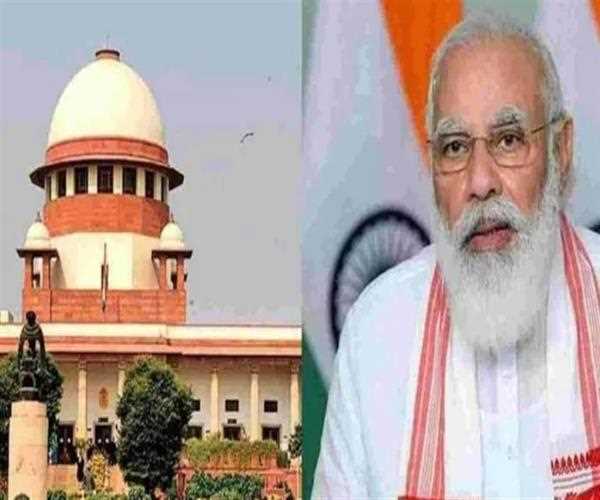
24-Jun-2022 , Updated on 6/27/2022 12:25:39 AM
Supreme Court gives clean chit to PM and Others in Gujarat Riots
In an appeal against Prime Minister Narendra Modi and 63 other people, including officials and politicians, about the 2002 Gujarat riots, Congress leader Ehsan Jafri's widow, Zakia Jafri, appealed to the Supreme Court on Friday. She wanted to look into 'the bigger plot' that led to the riots.
A three-judge panel ruled that the appeal lacked substance and affirmed the Metropolitan Magistrate's and later the High Court's judgments to accept the Special Investigation Team's (SIT) clean bill of health for Prime Minister Modi and others.
The appellant was criticised by the highest court for 'bordering on undermining the integrity and sincerity of investigators', while the SIT was complimented for its work. In addition, the court mentioned 'certain dissatisfied Gujarat officials and others seeking to create a sensation by making false discoveries to keep the pot boiling for ulterior intents.' According to the bench, people responsible for such 'abuse of procedure deserve to be in the dock and face the law.'
Here is a brief overview of the Gujarat riots before we discuss Zakia Jafri's case.
58 people perished after a Sabarmati Express carriage carrying karsevaks returning from Ayodhya caught fire at Godhra, Gujarat, on February 27, 2002. This resulted in widespread unrest throughout the state, necessitating the deployment of army soldiers by the federal government.
According to official figures, 1,044 people were murdered in this incident of religious violence in India, including 790 Muslims and 254 Hindus.
There have also been reports of rapes, looting, and property destruction, including store and home fires. There were over 2 million displaced individuals.
Many of them relocated to different neighbourhoods since they were unable to return to their original ones.
A mob assaulted Ahmedabad's Gulbarg Society housing complex the day after the Sabarmati Express was set ablaze, killing 69 people, including former Congress MP Ehsan Jafri. The majority of the residents of the Gulbarg Society's bungalows and apartment complexes were Muslims. Other locations where mass murders took place were Naroda Patiya and Best Bakery.
When Modi was the state's chief minister in 2006, Zakia Jafri requested the Gujarat Police to register an FIR against a number of officials and politicians. The state administration, according to the woman, did not do anything to stop the rioting and save individuals, including her husband.
The Supreme Court formed an SIT in 2008 to look into Jafri's allegation and give a report on the rioting cases.
In 2012, the SIT cleared Modi and others, alleging 'no prosecutable evidence,' and it delivered the Magistrate a copy of its closing report.
Jafri submitted an appeal contesting the closure report in 2013.
The Magistrate rejected her petition and affirmed the SIT's closing report.
She petitioned the Gujarat High Court, which in 2017 affirmed the Magistrate's ruling as well.
In 2014, Modi was elected prime minister.
Jafri and activist Teesta Setalvad went to the highest court in 2018 to complain that the SIT had not looked at all the relevant evidence, that its inquiry was prejudiced, and that the investigators themselves should be subject to an investigation.
During the hearing, the state of Gujarat refuted the allegations and said that Jafri's plea was the brainchild of Setalvad, who was also accused of embezzling funds intended for the benefit of riot victims.
After holding its judgement the previous year, the Supreme Court affirmed the SIT probe in 2022.
The claims against Modi, according to Jafri and Setalvad's attorney, Kapil Sibal, were based on those made by former Gujarat police officer Sanjiv Bhat, who claimed to have been present at a vital cabinet meeting. There was no other way to confirm the allegations since, according to the SIT, Bhatt was not present for the meeting. And the Supreme Court has maintained the SIT's clean bill of health following the Magistrate and the High Court.
Around 600 people were identified in the 12 significant Godhra and post-Godhra rioting cases. About 150 of the approximately 200 defendants received life sentences. In light of these instances, judgments have been rendered by trial courts. Both the high court and the Supreme Court have heard challenges to those. And many families are still yearning for justice.
In certain cases, compensation has also been granted. For example, in 2019, Bilkis Bano, who was gang-raped in Gujarat's Dahod area during the post-Godhra riots, was handed Rs 50 lakh by the top court. When the crime was committed, she was 19 and pregnant. The Bombay High Court had found five police officers and two physicians guilty of tampering with evidence in the Bilkis Bano case in 2017.
Some of these instances were ones that the SIT re-examined. Regarding the Gulbarg Society case, a special Ahmedabad court found 24 assailants guilty in 2016 and exonerated 36 others, including a BJP councillor, because there was no bigger conspiracy.
Regarding the accusation of a 'bigger plot,' it is certainly the end of the chapter for PM Modi. In addition to giving the SIT high marks, the top court criticised the appellants for casting doubt on the investigators' objectivity. The bench stated that those responsible for 'keeping the cauldron boiling with false revelations and ulterior purposes ought to face the law,' but refrained from imposing punishment on the appellants.

Student
current post-graduate student at christ university and an aspiring content writer with experience in working on online content creation and research..
Join Our Newsletter
Subscribe to our newsletter to receive emails about new views posts, releases and updates.
Copyright 2010 - 2026 MindStick Software Pvt. Ltd. All Rights Reserved Privacy Policy | Terms & Conditions | Cookie Policy